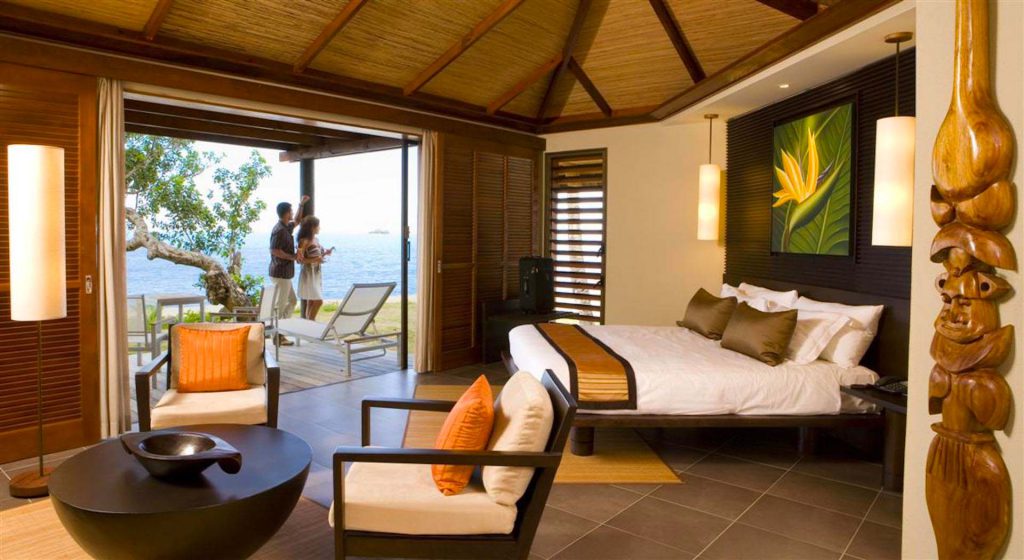Quality accommodation in Tieti Poindimiè
The Tieti Hotel is located at the heart of a 3 ha park where coconut trees and centennial banyan trees intermingle along the Tieti beach, which is reputed for its fine white sand. The centennial trees, plant and animal life forming part of this exceptional natural heritage have been respected when burying the frames in the soil. The management of the hotel explains that natural products have been mainly used as building materials.
A tasteful local artist touch
The whole complex perfectly blends in the landscape and 60 bungalows with a classy decoration are available in 3 categories – beachfront luxury suites, double bungalows and 20 standard rooms. They all bear a tasteful local artist touch. The roofing of the bungalows inspired from the Barringtonia (‘Djio’ in Kanak language), a local four-sided local fruit that looks like a bishop’s mitre, adds a typical character to the hotel. In the same vein, the restaurant is filled with light and its architecture and layout immerse guests in a classy and authentic atmosphere. A large swimming pool faces the restaurant and overlooks the beach, with an impregnable view on the sea and the imposing Tibarama islet. The hotel’s cuisine gives pride of place to local produce such as fruits, vegetables, fish and poultry, as well as recipes from the Pacific region as well as dishes with a French influence and a tropical touch such as raw fish Tahitian style or squids in coconut milk.
Opening up the region of the North
From the early phases of the development of the Tieti Hotel, information talks have been held with the local communities, first with the elected representatives and traditional chiefs, then directly with the population. Twenty-five people from the tribe were initially employed in the construction works. In parallel, potential hotel staff coming mainly from Poindimie and its neighbourhood were being trained by the territorial training body, including placements in different hotels of the territory.
Local job creation
Ultimately, some 40 inhabitants were recruited in executant positions at the opening of the hotel. An inventory of people from the tribe who had a tourism project offering opportunities to discover the region, its history and cultural highlights were also undertaken. Twelve candidates from the ‘Trois Vallées’ (Three Valleys) region, where the hotel is located, were finally selected to undergo a five-month training as tourism agents. The training was delivered by the ‘Groupement d’intérêt économique’ (GIE, Economic Interest Group) for Tourism of the North Province and was complemented by an immersion English learning programme in New Zealand for some of the participants. This intensive learning programme has enabled some of the participants to secure a job at the hotel while other are self-employed and offer tourist activities. Overall, more than 50 families from the tribe directly benefit from the opening of the hotel, besides indirect job creation in sectors such as agriculture, fishing and handicraft, providing a regular income to many families without having to leave the bush.
Developing an authentic upmarket tourism offering with a flavour
Stephane Brun, the hotel manager, says that the ex-company managing the hotel, the SOH (Société océanienne d’hôtellerie), and the Tieti tribe have sealed a special agreement. The SOH has sold its plot of land to the tribe against a credit but, in return, the company pays the tribe a rent of a higher amount. The surplus payment enables the tribe members to build up and manage a little nest egg. The investment in the hotel amounted to 1.8 bn French Pacific Francs, 51% of which was financed by ‘Côte Océanienne’ (SEM, mixed-economy company) of the North Province. The project it thus totally in line with the common will of a private company and of the local government to create employment, to open up the region and to develop an authentic upmarket tourism offering with a flavour.



